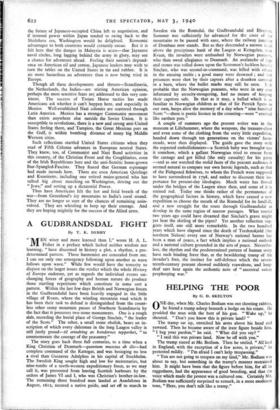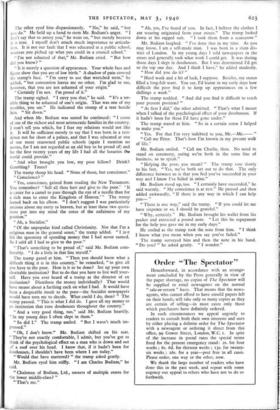HELPING THE POOR
By G. D. SKELTON
rINE day, when Mr. Charles Bodiam was out shooting rabbits, 1J he found a tramp asleep beneath a hedge on his estate. He prodded the man with the butt of his gun. "Wake up," he shouted. "Don't you know this is private land?"
The tramp sat up, stretched his arms above his head and yawned. Then he became aware of the irate figure beside him. "I beg your pardon," he said. "What did you say?"
"I said this was private land. Now be off with you."
The tramp stared at Mr. Bodiam. Then he smiled. "All land in England, with the exception of a few acres, is private," he protested mildly. "I'm afraid I can't help trespassing."
"You are not going to trespass on my land," Mr. Bodiam was about to say, but something in the tramp's manner restrained him. It might have been that the figure before him, for all its raggedness, had the appearance of good breeding, and that the voice which made the protest was a cultured one. Certainly Mr. Bodiam was sufficiently surprised to remark, in a more moderate tone, "Here, you don't talk like a tramp." The other eyed him dispassionately. "No," he said, "but you do." He held up a hand to stem Mr. Bodiam's anger. "I don't say that to annoy you," he went on, "but merely because it is true. I myself don't attach much importance to articula- tion. It is not our fault that I was educated at a public school, whereas you picked up what you could in a council school."
"I'm not ashamed of that," Mr. Bodiam cried. "But how did you know?"
"It is merely a question of appearance. Your whole face and figure show that you are of low birth." A shadow of pain crossed the tramp's face. "I'm sorry to use that wretched term," he added, "but convention leaves me no other. rm glad to see, however, that you are not ashamed of your origin."
"Certainly I'm not. I'm proud of it."
The tramp sighed. "I envy you that," he said. "It's a ter- rible thing to be ashamed of one's origin. That was one of my troubles, you see." He indicated the stump of a tree beside him. "Sit down."
And when Mr. Bodiam was seated he continued: "I come of one of the richest and most aristocratic families in,the country. I won't tell you which, for I fear my relations would not like it. It will be sufficient merely to say that I was born in a resi- dence not far short of a palace, and that I was educated at one of our more renowned public schools (again I mention no names, for I am not regarded as an old boy to be proud of) and for the first twenty years of my life I had all the luxuries the world could provide."
"And what brought you low, my poor fellow? Drink? Gambling? Taxes?
The tramp shoop his head. "None of those, but conscience." " Conscience? "
"Yes, conscience, gained from reading the New Testament. You remember? 'Sell all thou hast and give to the poor.' 'It is easier for a camel to pass through the eye of a needle than for a rich man to enter the Kingdom of Heaven.'" The tramp leaned back on his elbow. "I don't suggest I was particularly anxious about my entry to heaven, but at least those two quota- tions put into my mind the sense of the unfairness of my position."
" Ah, a Socialist."
"Of the unpopular kind called Christianity. Not that I'm a religious man in the general sense," the tramp added. "I just felt the ignominy of spending money that I had never earned. So I sold all I had to give to the poor."
"That's something to be proud of," said Mr. Bodiam com- fortably. "I do a little in that line myself."
The tramp gazed at him. "Then you should know what a difficult thing it is in this country," he remarked, "to give all you have to the poor. How is it to be done? Set up your own charitable institution? But to do that you have to live well your- self. Have you ever heard of a tramp as the director of an institution? Distribute the money individually? That would have meant about a farthing each on what I had. It would have been a despicable insult to the poor—the Socialist newspapers would have torn me to shreds. What could I do, then? " The tramp paused. "This is what I did do. I gave all my money to an institution that runs dosshouses throughout the country."
"And a very good thing, too," said Mr. Bodiam heartily. "In my young days I often slept in them."
"So did I." The tramp smiled. "But I wasn't much im- pressed."
"Oh, I don't know." Mr. Bodiam shifted on his seat. "They're not exactly comfortable, I admit, but you've got to think of the psychological effect on a man who is down and out of a roof over his head. I know that, if it hadn't been for dosshouses, I shouldn't have been where I am today."
"Would that have mattered?" the tramp asked gently.
Mr. Bodiam eyed him stiffly. "I am Charles Bodiam," he said.
"Chairman of Bodiam, Ltd., owners of multiple stores for the lower middle-class?"
"That's me." " Ah, yes, I've heard of you. In fact, I believe the clothes I am wearing originated from your stores." The tramp looked down at his ragged suit. "I took them from a scarecrow."
Mr. Bodiam laughed. "I've done that in my time. As you may know, I am a self-made man. I was born in a slum dis- trict of London. In my young days I sold newspapers in the street and generally took what work I could get. It was during those days I slept in dosshouses. But I was determined I'd get to the top one day. And I think I have," he added modestly.
"How did you do it?"
"Hard work and a bit of luck, I suppose. Besides, my stores filled a long-felt want. You see, I'd learnt in my early days how difficult the poor find it to keep up appearances on a few shillings a week."
The tramp nodded. "And did you find it difficult to reach your present position?"
"At first I did," the other admitted. "That's what I meant when I talked of the psychological effect of your dosshouses. If it hadn't been for those I'd have gone under."
The tramp stared at him. "So in a certain sense I helped to make you."
• "Yes. For that I'm very indebted to you, Mr.—Mr.-- " "Call me Peter. That's how I'm known in my present walk of life."
Mr. Bodiam smiled. "Call me Charlie, then. No need to stand on ceremony, seeing we're both in the same line of business, so to speak."
"Helping the poor, you mean?" The tramp rose slowly to his feet. "Yes, we've both set out to do that. The only difference between us is that you feel you've succeeded in your way and I know I've failed in mine."
Mr. Bodiam stood up, too. "I certainly have succeeded," he said warmly. "My conscience is at rest." He paused and then added awkwardly, "If there is any way in which I can help you—" "There is one way," said the tramp. "If you could let me have sixpence or so, I should be grateful."
"Why, certainly." Mr. Bodiam brought his wallet from his pocket and extracted a pound note. "Let this be repayment for the help you gave me in my early days."
He smiled as the tramp took the note from him. "I think I know what you mean when you say you've failed."
The tramp surveyed him and then the note in his hand. "Do you?" he asked gently. "I wonder."



































 Previous page
Previous page